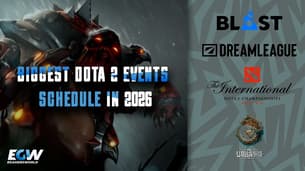
Кіберспортивні огляди, новини та проходження відеоігор
 Roblox Anime Guardians Codes лютий 2026 лютий 2026Відкрийте для себе всі робочі коди Roblox Anime Guardians. Обмінюйте на безкоштовні містичні монети, повторні випробування рис, артефакти та нагороди.
Roblox Anime Guardians Codes лютий 2026 лютий 2026Відкрийте для себе всі робочі коди Roblox Anime Guardians. Обмінюйте на безкоштовні містичні монети, повторні випробування рис, артефакти та нагороди. Онлайн-казино за межами Великобританії: Ігри, формати та що чекає на гравцівОнлайн-казино, що працюють за межами грального законодавства Великобританії, привертають увагу через відмінності в моделях ліцензування, ігрових портфоліо та рекламних акціях...
Онлайн-казино за межами Великобританії: Ігри, формати та що чекає на гравцівОнлайн-казино, що працюють за межами грального законодавства Великобританії, привертають увагу через відмінності в моделях ліцензування, ігрових портфоліо та рекламних акціях... Біткойн-казино та криптовалютні ігрові платформи для гравців з ВеликобританіїГемблінг-платформи на основі криптовалют стали помітним сегментом світового ринку онлайн-казино.
Біткойн-казино та криптовалютні ігрові платформи для гравців з ВеликобританіїГемблінг-платформи на основі криптовалют стали помітним сегментом світового ринку онлайн-казино. Найкращі міжнародні онлайн-казино для гравців з ВеликобританіїІндустрія онлайн-казино - це постійно зростаючий сектор, відомий своїми технологіями, великою бібліотекою ігор і обсягом прибутків, які він приносить...
Найкращі міжнародні онлайн-казино для гравців з ВеликобританіїІндустрія онлайн-казино - це постійно зростаючий сектор, відомий своїми технологіями, великою бібліотекою ігор і обсягом прибутків, які він приносить... Міжнародні букмекерські сайти для гравців з Великобританії (поза рамками UKGC) - листопад 2024 рокуЯк платформа, орієнтована на огляд міжнародних букмекерських сайтів, наша мета - надавати структуровану та актуальну інформацію про операторів, які...
Міжнародні букмекерські сайти для гравців з Великобританії (поза рамками UKGC) - листопад 2024 рокуЯк платформа, орієнтована на огляд міжнародних букмекерських сайтів, наша мета - надавати структуровану та актуальну інформацію про операторів, які... Преміум-бонуси на міжнародних платформах для ставок на спорт (посібник 2024)Пропонування бонусів стало звичною практикою в індустрії онлайн-беттінгу, допомагаючи операторам залучати нових користувачів і утримувати наявних.
Преміум-бонуси на міжнародних платформах для ставок на спорт (посібник 2024)Пропонування бонусів стало звичною практикою в індустрії онлайн-беттінгу, допомагаючи операторам залучати нових користувачів і утримувати наявних. 15 найкращих міжнародних казино для гравців з ВеликобританіїОнлайн-казино можуть працювати за дуже різними ліцензійними схемами, платіжними правилами та стандартами захисту гравців.
15 найкращих міжнародних казино для гравців з ВеликобританіїОнлайн-казино можуть працювати за дуже різними ліцензійними схемами, платіжними правилами та стандартами захисту гравців. Mewgenics 100% проходження квесту: Розширений посібникРозкрийте секрети 100% проходження Mewgenics за допомогою нашого розширеного путівника по всіх квестах на винаходи та розвиток.
Mewgenics 100% проходження квесту: Розширений посібникРозкрийте секрети 100% проходження Mewgenics за допомогою нашого розширеного путівника по всіх квестах на винаходи та розвиток. Кіберспортивні букмекерські контори Non-GamStop: Сфера регулювання та особливостіВідповідальність за азартну діяльність завжди лежить на гравцеві. Кожна людина повинна самостійно оцінити, чи має вона достатні фінансові можливості для того, щоб грати в азартні ігри...
Кіберспортивні букмекерські контори Non-GamStop: Сфера регулювання та особливостіВідповідальність за азартну діяльність завжди лежить на гравцеві. Кожна людина повинна самостійно оцінити, чи має вона достатні фінансові можливості для того, щоб грати в азартні ігри... Розклад найбільших подій у Dota 2 у 2026 роціВідкрийте для себе найбільший розклад подій з Dota 2 у 2026 році - як працює календар змагань, ключові турніри та The International 2026.
Розклад найбільших подій у Dota 2 у 2026 роціВідкрийте для себе найбільший розклад подій з Dota 2 у 2026 році - як працює календар змагань, ключові турніри та The International 2026.Найкращі статті
 Топ-10 найкращих браузерних покі-ігорПоговоримо про те, у що можна пограти на популярному сервісі з ностальгічними браузерними проектами.
Топ-10 найкращих браузерних покі-ігорПоговоримо про те, у що можна пограти на популярному сервісі з ностальгічними браузерними проектами. Найдорожчі скіни ножів CS2 та CS:GO у 2026.Хочете купити машину? А може, внутрішньоігровий скін за ту саму ціну може бути кращим?
Найдорожчі скіни ножів CS2 та CS:GO у 2026.Хочете купити машину? А може, внутрішньоігровий скін за ту саму ціну може бути кращим? 10 найкращих скінів M4A4 для CS2 та CS:GO, які можна придбати в 2026.Розповідаємо про найкращі варіанти надзвичайно популярної штурмової гвинтівки M4A4 у відомому шутері.
10 найкращих скінів M4A4 для CS2 та CS:GO, які можна придбати в 2026.Розповідаємо про найкращі варіанти надзвичайно популярної штурмової гвинтівки M4A4 у відомому шутері. 15 найкращих скінів для АК у CS2 та CS:GO, які можна купити сьогодніРозповідаємо про найкращі варіанти скінів на найпопулярнішу штурмову зброю в CS:GO.
15 найкращих скінів для АК у CS2 та CS:GO, які можна купити сьогодніРозповідаємо про найкращі варіанти скінів на найпопулярнішу штурмову зброю в CS:GO.  Найкращі скіни для ОГС, які варто купити у 2023 році: Бюджетний список (до $500)Розглянемо найкрасивіші скіни в CS:GO на AK-47, AWP, M4A1-S, USP-S, Desert Eagle та інші.
Найкращі скіни для ОГС, які варто купити у 2023 році: Бюджетний список (до $500)Розглянемо найкрасивіші скіни в CS:GO на AK-47, AWP, M4A1-S, USP-S, Desert Eagle та інші. Найкращі маркетплейси ОГС 2026: Де купувати та продавати скіни CSGOДавайте з'ясуємо, де найкраще купувати косметичні засоби для вашого інвентарю.
Найкращі маркетплейси ОГС 2026: Де купувати та продавати скіни CSGOДавайте з'ясуємо, де найкраще купувати косметичні засоби для вашого інвентарю. 


